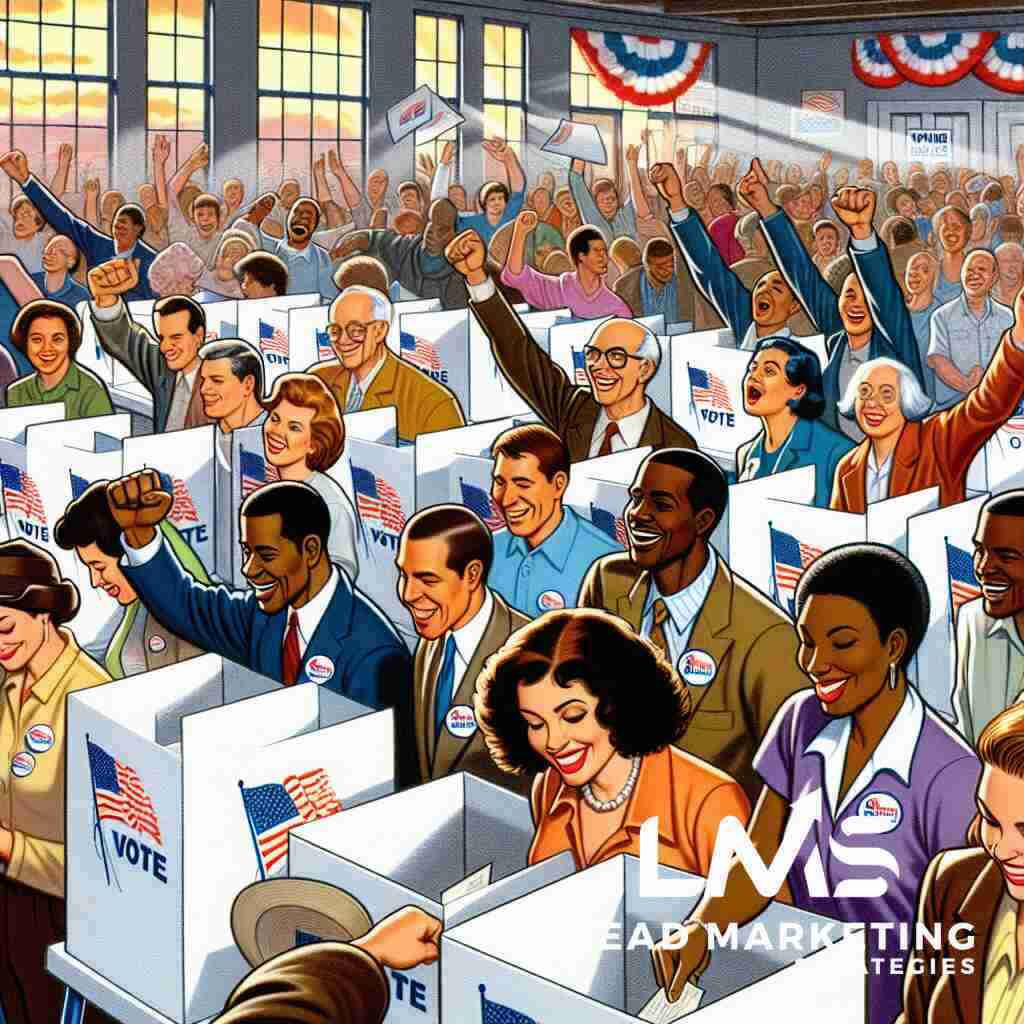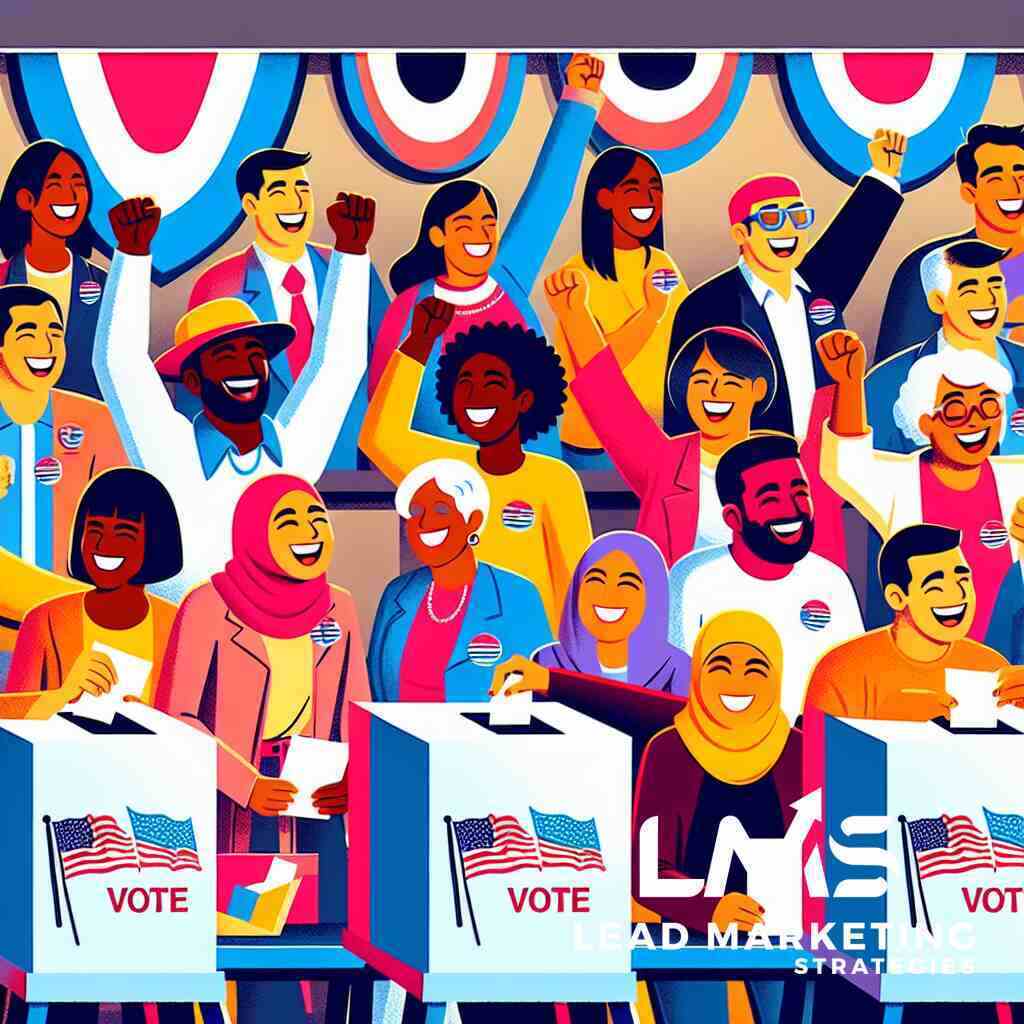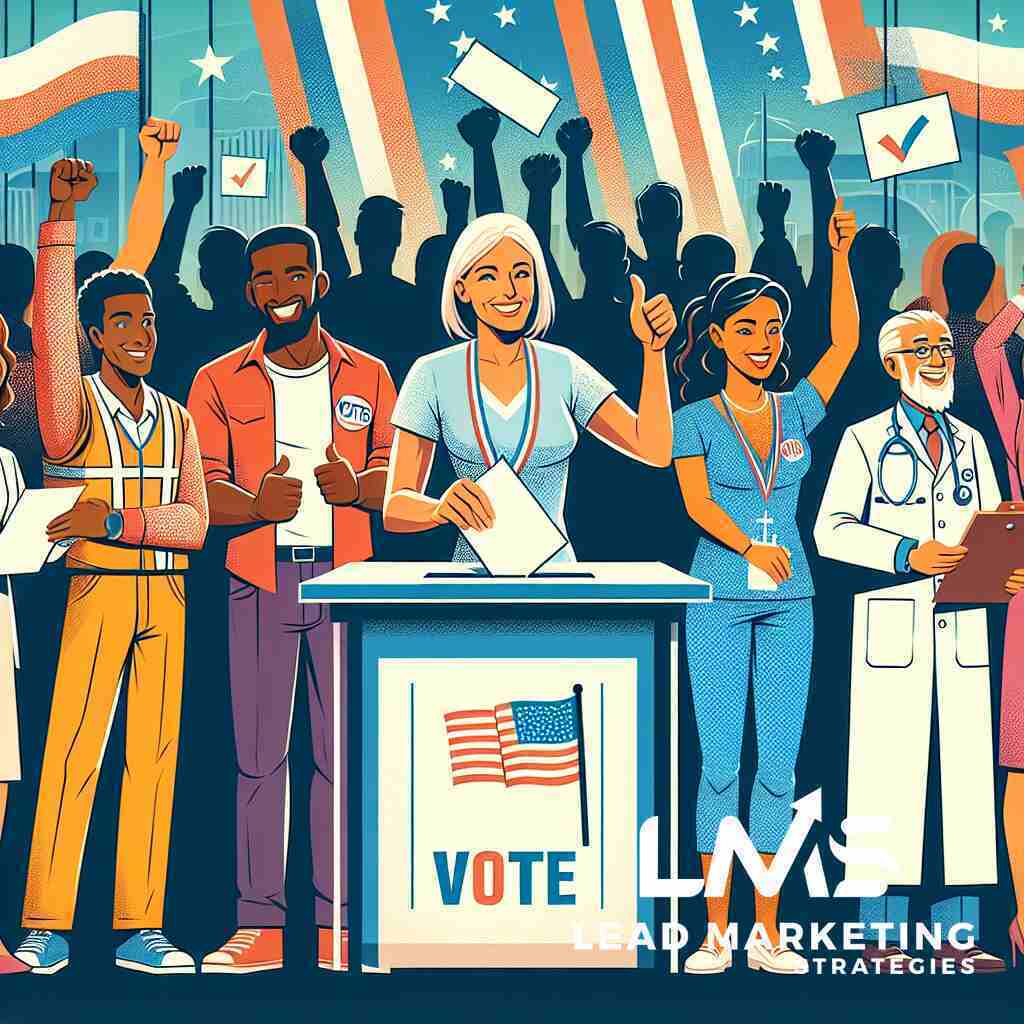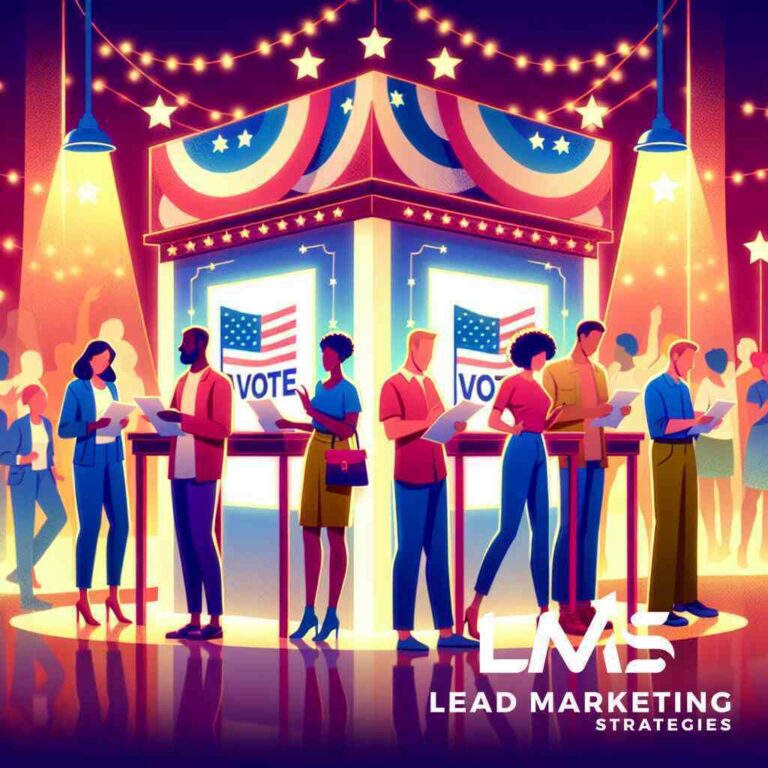Opening the Electoral Dialogue
The Power of Strategic Political Messaging
In the dynamic and ever-shifting landscape of politics, understanding the power of strategic political messaging is crucial for success. Political messaging, when crafted adeptly, can shape perceptions, influence voter decisions, and steer the course of an election. By utilizing carefully structured communication strategies, candidates can effectively convey their policies and visions to the electorate, thus gaining the voters’ trust and support. This underscores the significance of political communication strategies, which remain a cornerstone of a well-executed campaign. Implementing advanced techniques allows political entities to cut through the noise and resonate with their target audience, creating a powerful impact.
Why Messaging Resonates: Understanding Voter Psychology
To craft messages that truly resonate, it is vital to understand voter psychology. Voters are more likely to respond positively to messages that align with their values, emotions, and personal experiences. By tapping into these psychological aspects, candidates can create relatable narratives that build a connection with the electorate. This approach involves diving deep into the electorate’s concerns and motivations, tailoring the messaging to reflect empathy and understanding. Effective political narrative development relies heavily on this psychological insight, allowing candidates to communicate more persuasively and foster a sense of unity and shared purpose.
Setting the Stage for 2025
As we look ahead to the 2025 electoral landscape, setting the right stage through strategic messaging is more important than ever. The evolving political and social environment demands innovative approaches to communication and engagement. By anticipating election trend predictions for 2025, candidates can position themselves advantageously and address emerging issues effectively. In a world where instant digital communication prevails, harnessing the power of tech-driven storytelling and interactive platforms will be critical. This requires not only adapting to changing trends but also staying ahead of them, ensuring that candidates are armed with the strategies needed to succeed in the evolving electoral arena.
Crafting Messages that Matter
Political Narrative Development in the Digital Age
In the digital era, crafting impactful political narratives is paramount for candidates aiming to connect with modern electorates. As technology evolves, so does the way narratives are developed and disseminated. The implementation of effective political narrative development techniques empowers candidates to influence and engage through multiple digital channels. This approach facilitates personalized engagement, allowing campaigns to establish rapport with diverse voter segments. Leveraging data analytics and digital tools sharpens the focus of narratives, enabling them to echo voter sentiments and concerns effectively. With the proliferation of social media platforms and online forums, the ability to share narratives widely has transformed political campaign strategies in unprecedented ways.
Candidate Brand Messaging: Building a Trustworthy Persona
Building a trustworthy candidate persona is essential for ensuring voter trust and loyalty. Through strategic brand messaging, candidates can carve out a distinct, authentic identity that resonates with their target audience. By focusing on political campaign branding practices, candidates can maintain consistency in their messaging across all communication platforms. Establishing a coherent and relatable image involves articulating core values and highlighting individual strengths, which fortifies voter confidence. Employing strategies that emphasize transparency and integrity can further bolster a candidate’s public perception, thereby fostering a favorable image.
Strategic Messaging Frameworks for Different Populations
Designing strategic messaging frameworks requires a nuanced understanding of diverse voter demographics and their unique preferences. By employing tailored approaches to address different populations, candidates can improve their reach and influence. Utilizing data-driven insights allows campaigns to segment voter bases effectively, crafting personalized messages that speak directly to each group’s interests and priorities. This adaptability is crucial for addressing the multifaceted nature of electoral audiences, ensuring that communication is both relevant and compelling. Such frameworks are underpinned by extensive research, enabling candidates to adjust their narratives to meet evolving voter expectations.
Politician SEO and the Digital Presence Optimization
Optimizing a politician’s digital presence is a critical component of modern campaign strategies. Implementing tailored SEO strategies for political campaigns enhances visibility, making it easier for potential voters to find and engage with relevant content. An effective online strategy includes refining the digital footprint through keyword optimization, content management, and strategic use of analytics. How to Optimize Grassroots Campaign Strategies Near You. By focusing on political website optimization, campaigns can achieve higher search engine rankings and increased audience reach. This digital optimization goes beyond mere visibility, catering to the demand for accessible, relevant, and reliable information in today’s digital landscape.
Connecting Through Compelling Campaign Narratives
Voter-centric Communication Tactics
In political campaigns, voter-centric communication tactics are pivotal in ensuring successful engagement and resonance with the electorate. By placing voters at the heart of messaging strategies, candidates can craft communications that are not only relevant but also deeply impactful. This requires an authentic and nuanced understanding of voter needs, preferences, and expectations. Through comprehensive voter data enhancement solutions, campaigns can better segment and reach audiences with targeted communication.
Personalization is a cornerstone of these tactics. Data-driven insights allow for refining messages that speak directly to individual voter concerns, fostering a sense of inclusion and consideration. By engaging in ongoing feedback loops, campaigns can adapt messages to refine alignment with voter sentiment, ensuring that communication processes remain dynamic and responsive.
Election Campaign Messaging Techniques
Crafting effective election campaign messaging is a sophisticated art, combining both strategy and creativity. For the 2025 election cycle, staying abreast of campaign messaging techniques 2025 will be vital. These techniques encompass a broad range of practices, from crafting compelling slogans to utilizing data analytics for message optimization.
Strategic alignment with broader political objectives is essential. This involves distilling complex policy ideas into easily digestible content that retains its core message while appealing to a wide audience. Integrating emotional appeals and logical arguments helps create a resonant narrative that meets voters on multiple levels. Through strategic communication frameworks, candidates can create a comprehensive messaging approach that maximizes reach and impact.
The Art of Electoral Analytics for Message Tailoring
In modern political campaigns, electoral analytics is invaluable in shaping and tailoring messages. By harnessing political storytelling expertise, campaigns can utilize data to understand voter behavior and preferences, thereby crafting messages that align closely with those insights. This approach ensures that each communication touchpoint is strategically planned and executed to resonate deeply with its intended audience.
Electoral analytics involves processing vast amounts of data to derive actionable insights. This includes analyzing demographic data, historical voting patterns, and social media interactions to inform message development. The synthesis of these data elements allows for precision in targeting, enabling campaigners to tailor messages that address specific voter segments effectively.
By prioritizing data accuracy and relevancy, electoral analytics becomes a powerful tool in enhancing communication strategies, ensuring that every message is not only heard but also understood and appreciated by its audience.
Building Voter Engagement through Storytelling
Building voter engagement through storytelling has emerged as a critical technique in modern political campaigning. Stories have the unique ability to transcend barriers, making complex issues relatable and evoking emotional responses. The use of modern political storytelling techniques helps craft narratives that link the candidate’s vision with the electorate’s aspirations.
Stories bring policies to life, enabling voters to visualize the impact of their electoral choices. By humanizing the political discourse, storytelling fosters empathy and connection, turning abstract concepts into concrete realities. Effective storytellers focus on relatable experiences, often drawing from real-life stories that mirror the experiences of their audience.
As political narratives continue to adapt to the demands of digital communication, leveraging multimedia platforms enhances storytelling’s reach. Engaging visuals, impactful videos, and interactive content play pivotal roles in bringing stories to life, increasing voter engagement, and fostering deeper connections to the candidate’s message.
Elevating the Campaign Strategy
Political Message Crafting: Techniques for Clarity and Impact
Crafting political messages that are both clear and impactful requires a strategic blend of art and science. In developing an efficient candidate messaging strategy, it’s essential to focus on simplicity and directness while maintaining the integrity of the message. A structured approach, including precise language and targeted messaging, allows campaigns to communicate complex ideas succinctly. Techniques for clarity also involve steering away from jargon, instead opting for language that is both accessible and engaging to the general public.
Incorporating emotional appeals alongside factual arguments enhances the memorability of campaign messages. The deployment of narrative devices helps articulate key points while resonating emotionally with the audience. As candidates prepare for the 2025 election communication arena, the refinement of these techniques becomes indispensable. Through political messaging effectiveness, candidates can foster a connection with voters, enabling a strong candidate-voter resonance vitality for electoral success.
Harnessing Social Media for Political Influence
Leveraging social media’s role in political influence is pivotal for modern campaigns. Platforms like Twitter, Facebook, and Instagram serve as powerful tools for reaching vast, diverse audiences quickly and effectively. The challenge lies in mastering both content creation and audience engagement, which are vital components of any robust social media management for political campaigns.
To optimize digital outreach, it’s crucial to tailor content to each platform’s unique strengths while maintaining cohesive political messaging. By using data analytics, campaigns can refine their content strategy to reflect voter preferences, ensuring that the message resonates with targeted demographics. Moreover, engaging visual content- videos, infographics, and live streams- can amplify campaign messages, increasing engagement and amplifying reach.
Adopting proactive engagement strategies through direct voter interaction fosters loyalty and drives further dissemination of political content. Candidates who effectively harness these strategies set themselves apart in the digital era, where social media not only boosts visibility but also positions candidates as authoritative voices within the political discourse.
Political Narrative Crafting in Times of Crisis
Navigating the tumultuous waters of crisis requires specialized political narrative crafting. Times of crisis present unique challenges and opportunities for campaigns to demonstrate leadership and vision. Employing political messaging in times of crisis demands sensitivity, precision, and empathy, with an emphasis on authentic and transparent communication.
Crafting an effective narrative in such circumstances involves framing messages to acknowledge voter concerns while presenting viable solutions. This could mean prioritizing stories that demonstrate how past policies have mitigated similar crises, fostering hope, and articulating a clear path forward. Such strategies are critical for cultivating trust and reassurance among the electorate.
Using crisis as a backdrop, integrating personal anecdotes and experiences into campaign narratives humanizes candidates, establishing relatability and empathy. By consistently communicating their core values and steadfast commitment to addressing issues, candidates can inspire confidence even in the face of adversity.
Innovative Campaign Finance Marketing Approaches
Innovative campaign finance marketing is paramount to running successful campaigns in the current political climate. Implementing diverse financial strategies can significantly impact how resources are allocated and used. From grassroots fundraising to digital donor engagement, candidates need a comprehensive mix of approaches.
Emerging technologies and platforms offer new opportunities for political fundraising, allowing campaigns to reach wider audiences with tailored messages. Political fundraising marketing benefits from utilizing online advertising campaigns, enabling targeted outreach and efficient resource allocation.
Furthermore, transparency in campaign finance builds voter trust, an essential element of political perception management. Clear communication regarding the spending of funds engenders public confidence, enhances the campaign’s credibility, and fosters deeper connections with the electorate.
The Future of Political Communication
Anticipating 2025 Political Messaging Trends
As we approach the 2025 electoral cycle, anticipating shifts in political messaging trends becomes increasingly crucial. Candidates and their teams must remain vigilant, identifying patterns and adapting quickly to changing voter preferences and technological advancements. This foresight will be essential in crafting impactful political messaging that resonates authentically with diverse demographics. For instance, hyper-targeted content via sophisticated digital marketing for political campaigns has become more prevalent, enabling messages that align precisely with voter interests and concerns.
Additionally, political communication strategies must now account for the rising significance of mobile engagement, acknowledging the culturally diverse electorate’s interaction through multiple digital touchpoints. Social media’s role in constant connectivity offers a unique landscape for instant, direct voter interaction. Ultimately, embracing technological innovation paves the way for more nuanced and meaningful engagements, setting the stage for the successful adoption of anticipated 2025 trends.
Advancements in Political Discourse Strategy
The evolution of political discourse strategy in recent years has revolutionized how candidates communicate with their audience. Central to these advancements is a deeper integration of digital platforms, offering a democratized approach to engagement where every voice can be amplified. Successful strategies reflect a blend of human empathy with data-driven insights, crafting dialogues that meet voters at their preferred interaction points. As political parties in the USA contend with modern challenges, embracing empirical strategies that optimize digital outreach becomes mission-critical.
The advent of advanced analytics tools allows campaigners to detect and respond to voter sentiment shifts seamlessly, tailoring messages that foster genuine dialogue rather than top-down communication. In this dynamic landscape, the ability to balance immediacy with authenticity defines effective political discourse strategies. Strategic foresight and adaptation ensure candidates remain relevant, maximizing their influence while maintaining open channels for two-way communication.
Envisioning the Next Era ofElectorale Engagement Techniques
Reimagining electorate engagement techniques for the coming era involves embracing technological innovation to foster dynamic voter interaction. As political landscapes evolve, so do voter expectations, pushing campaigns to explore new realms of engagement that are both inclusive and interactive. Innovative techniques, such as geotargeting for voter outreach in New York, exemplify the capacity to reach hyper-localized audiences effectively, making engagement more relevant and impactful.
Interactive storytelling, enhanced by augmented and virtual reality, presents a promising avenue for deepening voter connection. These technologies allow campaigners to offer immersive experiences that personalize interaction and enhance understanding of key issues. Furthermore, cultivating partnerships with digital influencers can extend reach and bolster engagement, aligning messaging with trusted voices that voters resonate with. By marrying technology with creative engagement techniques, campaigns can foster meaningful connections across a diverse electorate spectrum.
Political Influence and Persuasive Communication
Navigating political influence through persuasive communication techniques is an art refined by understanding and empathy. As political climates grow increasingly complex, candidates must blend factual information with compelling storytelling to make a persuasive case to voters. Effective messaging strategies embrace social media’s role in political influence as a potent platform for disseminating persuasive narratives that capture attention and inspire action.
At the heart of persuasive communication lies the ability to craft narratives that align with core voter values, using emotional appeal alongside rational dialogue. Understanding psychological motivators and biases allows for the creation of content tailored to resonate with the audience deeply, transcending mere information delivery. The balance of narrative development, strategic framing, and data analytics fortifies candidates’ abilities to construct messages that not only persuade but also mobilize. Ultimately, mastering these techniques enhances a candidate’s position within the electoral dialogue, confidently steering voter perceptions and decisions.
Bringing it All Together
Key Takeaways for Successful Candidate Messaging
To achieve success in candidate messaging, it is crucial to embrace a strategic approach that encompasses clarity, emotional resonance, and data-driven insights. By focusing on concise language and effective message delivery, campaigns can ensure their communication is both impactful and accessible. Guidelines on Crafting a Political Message That Resonates. Political campaigns can leverage political web design success to create platforms that host these messages optimally. Emphasizing transparency and authenticity bolsters voter trust, which is a cornerstone for election victory. Integrating advanced technologies, such as data analytics and multimedia tools, provides a competitive edge in tailoring messages that align with voter sentiments and preferences. Understanding the intricacies of political rhetoric and voter psychology can transform campaign messages into powerful catalysts for engagement and support.
The Evolving Landscape of Political Perception Management
As the political landscape evolves, perception management becomes more complex and multi-faceted. Candidates must navigate this terrain by crafting narratives that resonate across diverse voter populations and through various digital platforms. Collaborating with a digital marketing agency on Long Island can particularly enhance efforts to manage and shape voter perceptions. This process involves not only crafting but also consistently reinforcing a strong brand identity that reflects campaign values and goals. Implementing proactive media strategies and robust crisis communication plans can effectively mitigate negative perceptions and enhance candidate credibility. It’s essential to remain vigilant about current news cycles and public sentiments to adjust narratives accordingly, ensuring candidates maintain relevance and resonance in the minds of constituents. Engaging in meaningful dialogue with voters and understanding their concerns will bolster voter confidence and positively influence public perception.
Preparing for Political Communication Beyond 2025
To prepare for the future of political communication beyond 2025, campaigns must remain adaptive to technological advancements and cultural shifts. A focus on futuristic communication tools, such as augmented reality and immersive storytelling, will redefine interaction with the electorate. Exploring Innovative Voter Engagement Tactics for 2025 Candidates should also invest in user experience design for political sites to enhance accessibility and engagement. Fostering a culture of continuous learning within campaign teams will ensure readiness to leverage emerging platforms and trends effectively. Additionally, understanding the growing importance of diversity and inclusivity in political messaging will allow campaigns to engage authentically with all voter segments. Commitment to ethical communication practices is crucial, as voters increasingly demand transparency and integrity. By anticipating these changes and strategically planning for the future, political entities can position themselves strongly in the political landscape and secure success long-term.
Frequently Asked Questions
Question: How do political marketing strategies help refine candidate messaging strategies to enhance voter communication for the 2025 election communication needs?
Answer: At Political Marketing Strategies, we specialize in refining candidate messaging strategies tailored to meet the evolving demands of the 2025 election communication landscape. Our approach involves comprehensive political messaging effectiveness techniques that ensure your campaign message resonates authentically with voters. By integrating advanced analytics and data-driven insights, we provide a strategic framework for impactful political messaging. This involves understanding voter psychology, leveraging digital platforms, and crafting political narratives that align with core voter values, ultimately enhancing voter engagement.
Question: What role does narrative development play in effective voter communication strategies, and how can Political Marketing Strategies support this?
Answer: Political narrative development is pivotal in shaping candidate brand messaging and fostering voter connection. At Political Marketing Strategies, we excel in crafting compelling political narratives that align electoral goals with voter interests. Crafting Voter-Friendly Online PR with Political Marketing. By employing strategic messaging for elections, we help candidates articulate clear, relatable stories that resonate with diverse audiences. Our expertise in political storytelling ensures that your narrative not only conveys policy positions but also builds emotional resonance, creating a candidate-voter resonance that drives voter loyalty and participation.
Question: How do Political Marketing Strategies utilize election campaign messaging techniques for impactful political messaging in the 2025 election?
Answer: Our proficiency in election campaign messaging techniques is designed to create impactful political messaging that meets the demands of modern electorates. The Ultimate Guide to Political Messaging: Precision Political Marketing Strategies draws upon election audience targeting and strategic narrative framing to craft messages that are both engaging and persuasive. By employing a combination of emotional appeals and data-driven insights, we ensure that candidates’ messages resonate with voter sentiment and priorities. Exploring Emotional Appeal in Political Brandin.g Our dedicated team leverages cutting-edge tools and tailored communication strategies to maximize reach and enhance voter engagement for the 2025 elections.
Question: How does the blog article on Understanding Candidate Messaging for 2025 Success relate to Political Marketing Strategies’ expertise in campaign message crafting and candidate communication best practices?
Answer: The blog article on Understanding Candidate Messaging for 2025 Success underscores the importance of strategic messaging in political campaigns, a domain where Political Marketing Strategies excels. Our experience in campaign message crafting is reflected in our ability to implement candidate communication best practices that align with the trends outlined in the article. We focus on delivering clear, persuasive political communication and refining message-driven campaign planning to ensure our clients’ success. By emphasizing political discourse strategy and strategic narrative framing, we prepare candidates to engage with voters and manage political perception effectively.
Question: What innovative electorate engagement techniques does Political Marketing Strategies offer to enhance candidate voter resonance?
Answer: At Political Marketing Strategies, we pioneer electorate engagement techniques that bolster candidate voter resonance and foster meaningful connections. Our strategies incorporate cutting-edge digital tools, including immersive storytelling and mobile engagement platforms, to reach voters where they are most active. The Ultimate Fall Guide to Digital Voter Engagement. By utilizing political narrative crafting and election message delivery systems, we tailor messages that speak directly to voter preferences and concerns. Ultimate Guide to Political Branding and Voter Engagement. Our approach ensures that campaigns are not only visible but also relatable, ultimately driving voter participation and support in the electoral process.





